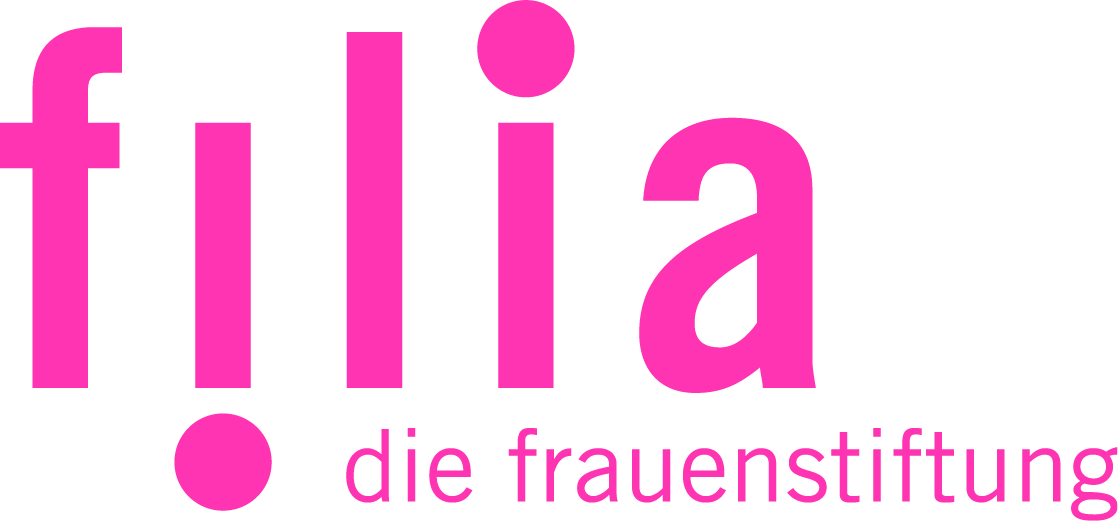Focus „Safe Spaces“
Feminist activism needs safe spaces
Having safe spaces is an important issue for feminist organizations. For example, when organizations work with and for victims of gender-based or racist violence, they require a particularly safe environment. Suvivors must feel protected so that help and counseling can be offered well and sustainably.
Often it is the feminist organizations and activists themselves who need safe spaces. Feminist organizations are often exposed to hostility and violent threats. In addition, there are often insecure and problematic tenancies, especially when organizations belong to a highly marginalized group, such as the Rom*nja. More and more partners of filia are looking for their own and safe spaces.
Enabling safe get-togethers
But we understand “safe spaces” not only in the literal sense. A safe space can also be a workshop for young women in which they are encouraged to formulate their own opinions and question stereotypical gender roles. Or it may be a computer class or a craft group where people from marginalized groups come together. In addition to the skills acquired, it is primarily the community that gives strength to those affected by discrimination. Experiencing the majority in a safe space, knowing that they are not alone with their problems and experiences, is an empowering moment for many marginalized women and girls.
It is part of filia’s grantmaking principles to focus on the needs of her partners. Thus, the focus on safe spaces has developed organically in recent years. filia supports her partners in acquiring their own spaces or, where possible, in renovating rented spaces. It is critical that the spaces fit the needs of the organization and, more importantly, the people the organization serves.
Disclaimer: We know that there are no absolutely safe spaces for feminist activism. There is a growing trend to use the term “safer spaces” instead of “safe spaces”. In this way, it is expressed that threat and hostility can never be completely excluded. We decided to continue using “safe spaces” for now. When talking about “safe spaces” we do so assuming that the activists are striving to create a place free of discrimination and threat.
Current Projects in the focus “Safe Spaces”
Strategic Grant for Roma Center Daje – Serbia
More Information … »
Strategic Grant for a Chechen organisation
More Information … »
Grant for Patchwork – Poland
More Information … »
Current Projects in the Focus “Safe Spaces”
Strategic Grant for the Serbian organisation Roma Center Daje
The Roma Center Daje was founded in 2001 in Belgrade, Serbia. The organization has been a strategic partner of filia since 2018. Daje has a wide range of work: The organization helps in cases of gender-based violence. For example, it maintains a 24-hour SOS hotline. The activists also work against early marriages in Rom*nja communities. They educate people in the communities and raise awareness among Serbian authorities. Daje is an important voice for Rom*nja communities in Serbia. The organization tirelessly collects data to prove existing discrimination against Rom*nja. However, Daje also works beyond the country’s borders and advocates at the European level for the end of early marriages in Rom*nja communities.
With filia’s help, Daje was able to purchase its own house in 2022. Having its own property means the organization can be more visible. It also facilitates the counseling work. Those affected now have a safer space where they can find support.
Grant for the Polisch organization Patchwork as part of our Campaign #standwithukraine
Patchwork is an organization based in Krakow, Poland, supporting immigrant families with people with disabilities. The organization grew out of a self-help group and has only existed for a few years. Since the outbreak of the war in Ukraine, the activists have mostly been taking care of Ukrainian mothers and their children with disabilities. Previously, the families supported came not only from Ukraine but also from Armenia, Belarus, Moldova and Russia. The activists help the women to find adequate accommodation and procure necessary aids and care products (diapers, dietary products, wheelchairs, orthopedic shoes, etc.). They also provide advice on the asylum procedure and help in medical emergencies.
Through filia’s campaign, Patchwork was able to set up an integration and support center. At the center, the children receive necessary therapies, while their mothers can take advantage of various offers: Language courses, work training, or simply a cup of tea to talk and rest.
Strategic Grant for a Chechen organisation*
Our grantee is the only youth organization working for the rights of girls in the villages of the remote mountainous regions of Chechnya. The activists create safe spaces for women and girls to experience encouragement to shape their own lives and discover new possibilities for themselves. The community of solidarity they experience at these meetings is designed to let them find relief from the enormous pressures their families and society place on them. filia’s multi-year grant is the only stable funding for the project and allows the activists to hold their “Women’s and Girls’ Clubs for Change.”
*Due to security concerns on the part of our partner, we have decided to remove her organization name from our publications.
Grant for the Polisch organization Fundacja w Stronę Dialogu as part of our Campaign #standwithukraine
Founded in 2012 by Roma and non-Roma women, Fundacja w Stronę Dialogu focuses its work on the perspectives and experiences of Rom*nja and promotes intercultural dialogue. Shortly after Russia’s invasion of Ukraine, Fundacja w Stronę Dialogu opened a Rom*nja community center in Warsaw, Poland. The center is a refuge for Rom*nja who have fled Ukraine, especially women and children. Thanks to filia’s support, it was possible, among other things, to rent spacious premises including a terrace and garden. The services offered at the center are based on the needs and demand of the beneficiaries. In addition to teaching economically useful skills, the aim is always to strengthen the community of the refugee Rom*nja. In their work, the activists of Fundacja w Stronę Dialogu particularly focus on strengthening the self-esteem of their beneficiaries by valuing the skills of each individual as well as the cultural heritage of the Rom*nja.


